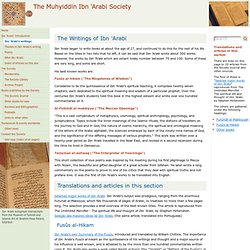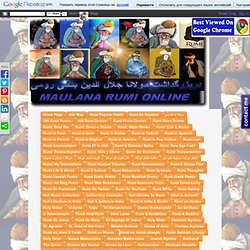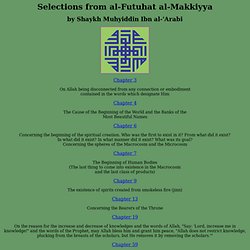

The works of Muhyiddin Ibn 'Arabi - translations from and introductions to many titles. The Writings of Ibn 'Arabi Ibn 'Arabi began to write books at about the age of 27, and continued to do this for the rest of his life.

Based on the titles in two lists that he left, it can be said that Ibn 'Arabi wrote about 300 works. However, the works by Ibn 'Arabi which are extant today number between 75 and 100. Some of these are very long, and some are short. His best known works are: Fusûs al-hikam ("The Ringstones of Wisdom") Considered to be the quintessence of Ibn 'Arabi's spiritual teaching, it comprises twenty-seven chapters, each dedicated to the spiritual meaning and wisdom of a particular prophet.
Al-Futûhât al-makkiyya ("The Meccan Openings") "This is a vast compendium of metaphysics, cosmology, spiritual anthropology, psychology, and jurisprudence. Tarjuman al-ashwaq ("The Interpreter of Yearnings") Translations and articles in this section Selected major works of Ibn 'Arabi. Fusûs al-Hikam Ibn 'Arabi's own Summary of the Fusûs, introduced and translated by William Chittick. Ibn Arabi's Profound Sufi Teachings. Ibn Arabí: El Mago Sufí "En ocasiones, las experiencias místicas y la propia vida transcurren tan de la mano que es difícil diferenciar dónde acaba una y empieza la otra.

Éste es el caso del maestro sufí del siglo XII Ibn Arabí, quien supo que había sido "elegido" mediante un sueño, mantuvo misteriosos "encuentros" con el anterior Qutb de la espiritualidad islámica, protagonizó fenómenos de bilocación y predijo antes de morir el hallazgo de un fabuloso tesoro. Un auténtico "mago" sufí cuyo legado intelectual -más de 400 obras- es aún más prodigioso que su azarosa vida.
La figura de Ibn Arabí supera las fronteras geográficas e históricas, culturales o religiosas, y se extiende a todo aquel que quiera y pueda comprender que "Dios no oculta nada al humano que comprenda que es Uno con Dios". Entonces, la familia Al-Arabí se trasladó a Sevilla (1173), donde el pequeño Muhammad estudió Gramática, Literatura, Teología y Filosofía con los mejores maestros de su época. Ibn 'Arabi, les secrets du jeûne. IbnContents. Selections from al-Futuhat al-Makkiyya by Shaykh Muhyiddin Ibn al-'Arabi Chapter 3 On Allah being disconnected from any connection or embodiment contained in the words which designate Him Chapter 4 The Cause of the Beginning of the World and the Ranks of the Most Beautiful Names Chapter 6 Concerning the beginning of the spiritual creation.

Chapter 7 The Beginning of Human Bodies (The last thing to come into existence in the Macrocosm and the last class of products) Chapter 9 The existence of spirits created from smokeless fire (jinn) Chapter 13 Concerning the Bearers of the Throne Chapter 19 On the reason for the increase and decrease of knowledges and the words of Allah, "Say: 'Lord, increase me in knowledge! " Chapter 59 Concerning existent time and determined time Chapter 66 Concerning the secret of the Shari'a, outward and inward, and which Divine Name brought it into existence Chapter 71 On the Secrets of Fasting (Selections) Return to Home Page. Fusus Al Hikam (Ringstones of Wisdom) - Muhiyuddin Ibn Arabi - Soufisme.
La Imaginación Divina y el Mundo Intermedio: Ibn 'Arabī y el Barzaj.